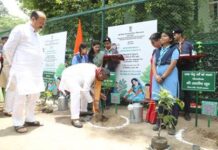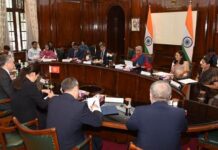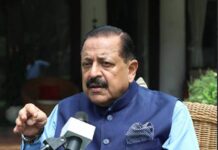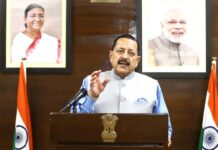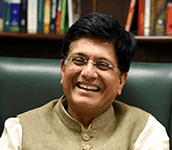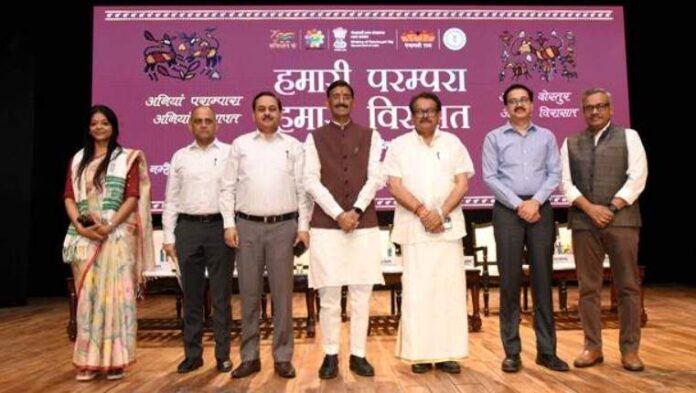APRIL 4: A special event under the “Hamari Parampara, Hamari Virasat” program, held in conjunction with Sarhul Mahotsav 2025, by the Ministry of Panchayati Raj (MoPR), in collaboration with the Government of Jharkhand, marked a significant step in celebrating India’s indigenous heritage in New Delhi, today. The event, marking the 150th Birth Anniversary Year of Bhagwan Birsa Munda (Janjatiya Gaurav Varsh), celebrated tribal heritage at the national level. It was inaugurated by Prof. S.P. Singh Baghel, Union Minister of State for Panchayati Raj, and Shri Sanjay Seth, Union Minister of State for Defence, in the presence of Shri Vivek Bharadwaj, Secretary, MoPR, Shri Sushil Kumar Lohani, Additional Secretary, MoPR along with other key officials of the Ministry of Panchayati Raj and Government of Jharkhand along with over 560 tribal representatives from Jharkhand.
Union Minister of State for Panchayati Raj, Prof. S. P. Singh Baghel, in his address, emphasized the significance of preserving India’s tribal culture that encompasses their local languages, music, food, and traditions defining their rich heritage. He articulated that the recording and documentation of “Lok Bhasha, Bhoosha, Bhojan, Sangeet” is imperative for keeping the nation’s heritage alive for future generations. While commemorating the valour and sacrifice of Bhagwan Birsa Munda in his 150th birth anniversary year, Prof. Baghel particularly acknowledged the invaluable contributions of tribal communities in the struggle against British colonialism, especially in the fight to conserve essential resources of “Jal–Jangal–Jameen” (water, forest, land). He highlighted how Adivasis, being the most indigenous group, have played a crucial role in environmental protection. Prof. Baghel noted that the Adivasis’ environmental conservation efforts are not merely part of their legacy but are vital to the overall ecological health of mother earth. He commended the community’s profound connection to land and environment, which has enabled them to preserve natural resources across generations. “If we had learnt the values like respect for nature from the tribal way of living, problems like global warming, ecological imbalance and ozone depletion may not have become so serious”, added Prof. Baghel. He urged tribal communities to prioritize their children’s education, as it is the cornerstone for societal upliftment and progress.
Shri Sanjay Seth, Union Minister of State for Defence, addressing the “Hamari Parampara Hamari Virasat” program, highlighted Bhagwan Birsa Munda’s inspiring legacy and appreciated the cultural awareness of Jharkhand’s tribal groups, that have immensely contributed to India’s rich cultural traditions. Referring to the Tribal Museum in Ranchi, established at the site where Bhagwan Birsa Munda was imprisoned during British rule, he stated that this museum serves as an inspiration center for future generations. Union Minister of State said “Hon’ble Prime Minister Shri Narendra Modi Ji inspires us to connect heritage with development. Taking forward this vision, the Sarhul festival organised in New Delhi gave a strong message to the nation – conserve Jal, Jangal aur Jameen. The contribution of the tribal community in preserving India’s civilizational values is unparallel. Sarhul reflects the belief that the closer we are to nature, the more joyful, energetic, and prosperous our lives become”.
Shri Vivek Bharadwaj, Secretary, Ministry of Panchayati Raj, emphasized the vital importance of preserving rich tribal cultural heritage that forms the backbone of India’s diverse traditions. He asserted, “Our tribal songs, music, folklore, and traditions are invaluable treasures. If we do not safeguard them, they risk fading away with time. It is not just our duty but a profound responsibility to protect and nurture these cultural legacies for future generations”. Shri Bharadwaj apprised that over 3,000 villages in Jharkhand, have pledged to actively participate in this campaign to safeguard their art, culture, and traditions. He called for accelerated efforts in Jharkhand to establish it as a model for other States, showcasing how cultural preservation can thrive through community engagement.
The “Hamari Parampara Hamari Virasat” initiative helps to integrate tribal heritage into the nation’s cultural and governance framework. Envisioned and supported by the Ministry of Panchayati Raj, this campaign was launched by the Department of Panchayati Raj, Government of Jharkhand on 26th January 2025 and has already witnessed more than 3,000 villages pledging their dedication to preserving traditional self-governance and cultural legacy. The objective of “Hamari Parampara Hamari Virasat” is to preserve, enhance, and transmit to future generations the cultural heritage, folk songs, festivals, and worship practices integral to the traditional governance systems of various Scheduled Tribe communities in Scheduled Areas. The program aims to document the vibrant history and cultural practices of villages across Jharkhand. This initiative aligns closely with the Panchayats (Extension to the Scheduled Areas) Act, 1996 (PESA Act), which empowers Gram Sabhas in Scheduled Areas to safeguard tribal customs, traditions, and self-governance. The Ministry of Panchayati Raj has constituted a high-level committee to oversee the successful implementation of this initiative, ensuring that the traditional governance structures of Scheduled Tribes continue to thrive.






